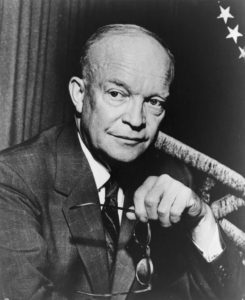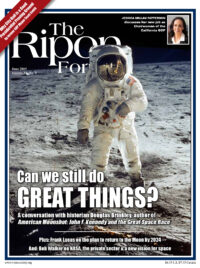
With the 75th anniversary of D-Day behind us and the 50th anniversary of the Apollo 11 Moon landing occurring next month, it is a good time to remember the accomplishments of a leader who helped shape both events.
The leader was Dwight D. Eisenhower. As Supreme Allied Commander in Europe during World War II, Eisenhower was the architect of the Normandy landing – the General who commanded the troops, approved the invasion, and was ready to accept lone responsibility for the risky and massive undertaking had it failed.
Just over a dozen years later, while serving as President, Ike played an equally critical role in laying the foundation of the space program. The National Aeronautics and Space Administration was established during his presidency, and the race to catch and surpass the Soviet Union in satellite and rocket technology following the launch of Sputnik in October 1957 was largely accomplished before he left office in January of 1961.
And yet Eisenhower’s legacy with regard to the space program remains somewhat unheralded. In part, this is because of the pivotal role that President John F. Kennedy played in the space program’s early years, when he declared in May 1961 that America “should commit itself to achieving the goal, before this decade is out, of landing a man on the Moon and returning him safely to the Earth.” Eisenhower’s legacy in space is further complicated by his reaction to this bold challenge by JFK. In short, he was opposed to it.
While JFK is rightly credited with kick-starting the space program with his bold challenge to land a man on the Moon, it was Eisenhower who started the space program and got things off the ground.
As historian Douglas Brinkley documents in his recent book, “American Moonshot,” Eisenhower’s opposition was driven not by his belief that Americans should refrain from exploring the cosmos — he supported that, which he proved as President. Rather, his opposition was driven by his conviction that engaging the Soviets in a race to the Moon was too costly with little strategic gain. “By all means we must carry on our explorations in space,” Brinkley quotes Eisenhower as writing in an op-ed for the Saturday Evening Post. “But I frankly do not see the need as such a fantastically expensive crash program.”
Privately, Ike was even more scathing. “Of all the silly, immature proposals,” Ike wrote in a letter that was found in the archives of The Ripon Society, “this was one of the most stupid and costly that quickly comes to mind. We have no way of knowing whether the Soviets have accepted or laughingly ignored the challenge; we do know that the prestige of America depends upon her solid accomplishments in world-betterment rather than games and stunts.”
Eisenhower died in March 1969, so we have no way of knowing whether he would have changed his mind if he had lived to see Apollo 11 touch down on the lunar surface in July of that year. But we do know that he wasn’t alone in questioning the wisdom of making the Moonshot a national priority.
Indeed, as Yanek Mieczkowski writes in “Eisenhower’s Sputnik Moment,” Kennedy himself raised similar questions about the mission two months before his own death. Recounting a September 1963 meeting JFK had with then-NASA Administrator James Webb, Mieczkowski writes that: “[Kennedy] stressed to Webb that they needed to rationalize the mission using national security reasons rather than the country’s world image, explaining, ‘The most we can say is this has got some military justification and not just prestige. Otherwise, Eisenhower who’s been kicking it around … he’s going to look like he’s probably right.’”
NASA was established during Ike’s presidency, and the race to catch and surpass the Soviet Union in satellite and rocket technology following the launch of Sputnik was largely accomplished before he left office.
Right or not, one thing is certain looking back on these events today — while John F. Kennedy is rightly credited with kick-starting the space program with his bold challenge to land a man on the Moon, it was Dwight D. Eisenhower who started the space program and got things off the ground. “NASA’s founding secured Eisenhower’s legacy in space policy,” Mieczkowski writes, “and the organization flowered during the last two years of his presidency.”
Mieczkowski notes that Ike accelerated funding for the Saturn super-booster, an early version of the rocket that would eventually take America to the Moon. He also boosted research and development in another critical area — satellite technology. “When Eisenhower left office,” Mieczkowski writes, “two numbers stood out: thirty-one and nine. The United States had sent thirty-one satellites into space; the Soviet Union, nine.”
On December 19, 1958, one of those satellites broadcast a Christmas message from the President of the United States to the people of the world — making Eisenhower’s the first voice that was ever broadcast from space. Just over fourteen years earlier, that same voice had been used to launch three million men into battle. Now it was being used to convey a message of peace and goodwill around the globe.
America has come a long way since D-Day. The world has come a long way. And as America and the world prepare to mark the 50th anniversary of the Moon landing next month, it is fitting that we remember not only the critical role that Dwight D. Eisenhower played in both events, but how the leadership he provided as General and as President shaped the world we live in today.
Lou Zickar is the Editor of The Ripon Forum, a centrist Republican journal of political thought and opinion published by The Ripon Society.




